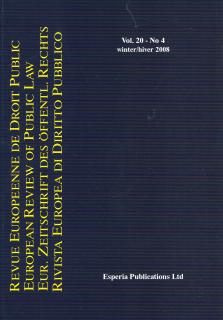
El error judicial en chile
a través de la convención interamericana de derechos humanos
(The Judicial Error in Chile
through the Interamerican Convention of Human Rights)
Consejero especial al Director, EPLO, Profesor, Glasgow Caledonian University, UK
This article deals with an issue that has important consequences for innocent individuals. In the judicial system of Chile there is a provision in the Constitution of the country which entitles those individuals who have been affected by a judicial error, to claim monetary compensation from the State. As a result of the inherently restrictive nature of the provision and an even more restrictive interpretation by the Chilean Supreme Court, the protection offered by the right in question has been proved to be ineffective. This is an unacceptable situation, which necessitates that a suitable solution be found. In that respect, it should be remembered that Chile has become signatory to the American Convention on Human Rights (Pact of San José, Costa Rica). The fact that the Convention in question deals with human rights issues demands that, in terms of its hierarchical classification in domestic legislation, it should not be treated as just another international agreement. In any case, from a hierarchical point of view, since the Convention has acquired the status of domestic law in Chile and its provisions sit on the same level as the constitutional provisions, the former could ostensibly be utilised in order to find an effective solution on the issue of judicial error. As the Convention indeed contains a provision recognising the right of individuals to be compensated in case of a judicial error, a clash between the relevant constitutional provision and that of the Convention seems inevitable and the onus of dealing with the consequences of that clash lies with the domestic courts. The solution put forward by the present work is that, since both provisions constitute domestic legislation, they are hierarchically equal and as a consequence they complement each other perfectly.
El presente artículo tiene por objeto llamar la atención sobre un tema que produce graves consecuencias en personas inocentes. En Chile el ordenamiento jurídico reconoce en la Constitución la posibilidad que los afectados por un error judicial puedan obtener del Estado una compensación pecuniaria. Debido a lo restrictivo de la norma y a una interpretación aún más estricta por parte de la Corte Suprema chilena, la aplicación real del derecho en cuestión se ha tornado impracticable. Ante esta situación deplorable, surge la necesidad de encontrar una solución, que permita contrarrestar los efectos perniciosos que la disposición constitucional - y su interpretación por parte del máximo tribunal - ocasionan. A este respecto no debe olvidarse que Chile ha suscrito el Pacto de San José de Costa Rica. Dicho Pacto versa sobre derechos humanos, y por lo tanto, no tiene en el ordenamiento interno el mismo tratamiento que un tratado internacional común y corriente. Pues bien, al ser el Pacto de San José de Costa Rica norma interna, y desde el punto de vista jerárquico, encontrarse al mismo nivel que las normas constitucionales, se puede hacer uso de dicho cuerpo normativo, con el objeto de encontrar una solución efectiva en materia de error judicial. El Pacto de San José contiene una norma que reconoce el derecho a ser indemnizado en caso de ser condenado por sentencia que adolezca de error. Se produce por tanto un aparente choque entre las dos normas - la constitucional y la contenida en el Pacto - problema que debe ser solucionado por los tribunales. La solución que se propone en este trabajo es invocar ambas normas, ya que las dos constituyen derecho interno, tienen la misma jerarquía, y se pueden perfectamente complementar.





















